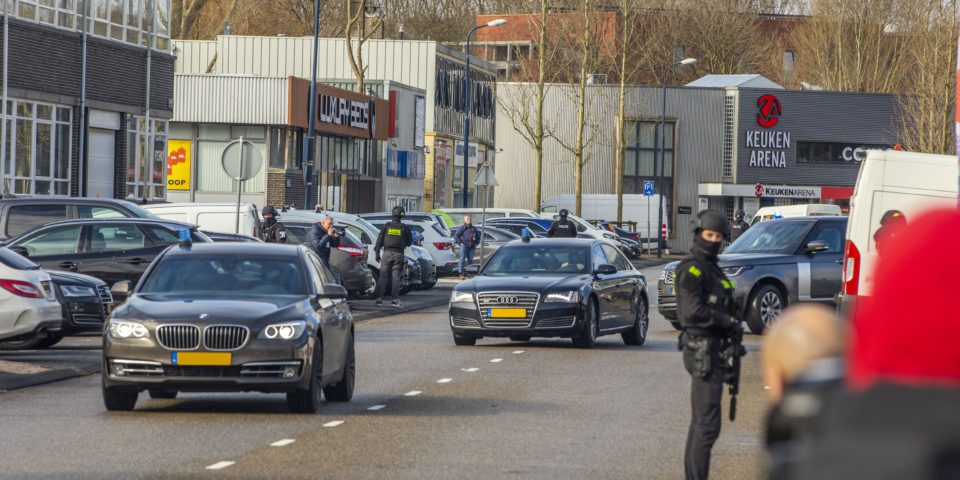By AML Intelligence Correspondents
A Dutch court has sentenced a member of the so-called “super cartel” to life in jail over a campaign of murders and attempted killings that prosecutors described as “a well-oiled killing machine”.
Ridouan Taghi was among three gang members handed life terms, with 14 others sentenced to between 21 months and 29 years in jail after an unprecedented trial whose nearly six years of hearings were marked by three more related murders.
Taghi, a Moroccan-born Dutch national led the “Angels of Death” cartel and was part of the Dubai-based “Super Cartel.”
Taghi is suspected of ordering three further murders during the trial, including of a top lawyer and a prominent journalist in the Netherlands, and pulling strings even from behind bars following his arrest in Dubai.
Taghi was extradited from UAE, where key super cartel traffickers had long lived opulent lifestyles believing themselves up to now safe from capture.
His extradition paved the way for those of other top crime figures, including France’s convicted Moufide ‘Mouf’ Bouchibi, known as “The Ghost” and Raffaele Imperiale, an alleged Italian Camorra mafia boss who has turned state’s witness in Italy.
Europol in 2022 said it had smashed the heart of the super cartel’s command and logistics operations when it arrested 49 people in raids across Europe and in Dubai.
Masked and armed police today (Tuesday) surrounded the courthouse, known as the Bunker, in an Amsterdam suburb as the judges, who were not named and whose faces were hidden from view, read out the sentences. Drones and a police helicopter circled overhead.
“We are sentencing all the suspects. Ridouan Taghi gets life,” said a judge. The court ruled that Taghi was the gang’s “undisputed leader” and that the proceedings, known as the “Marengo” trial after the judicial codeword for the case, had been fair.
Taghi, who was arrested in Dubai and extradited in 2019, and several of his co-defendants did not attend the final day of the trial, which has enthralled and shaken the country as details of its violent drugs underworld were exposed.#
He is closely associated with the Kinahan Cartel, the OCG lead by Irishman Christy Kinahan and his sons. All have had $5M bounties placed on them in sanctions by the US government. They are suspected of hiding out in Dubai.
Earlier this month, national police in Ireland (An Garda Siochana, AGS) seized a haul of crystal meth worth an estimated €33mn, exposing alleged links between Kinahan’s group and Mexico’s notorious Sinaloa cartel.
The Dutch case revolved around six charges of murder, four of attempted murder and several more of planning various hit operations between 2015 and 2017, mainly against people the gang suspected had become police informants.
The court convicted Taghi in five of the murders. “He decided who would be killed and spared no one,” the presiding judge said. “The amount of suffering Taghi caused to the victims and their loved ones is barely imaginable.”
The judges also ruled that Taghi had used extreme violence to intimidate enemies and potential police informants. “By doing so he prevented people from cooperating with the police. Such terror has a disruptive effect on society,” the judge said.
Three murders, all related to a suspected gang member named as Nabil B, who handed himself in to police and agreed to be the prosecution’s main witness, were also committed during the trial and are the subject of separate court proceedings.
Nabil B’s brother was killed in 2018. His lawyer, Derk Wiersum, was shot dead outside his home in Amsterdam the following year, and in July 2021 Peter R de Vries, a well-known TV journalist who had been acting as Nabil B’s confidant, was gunned down.
De Vries, who had said he was on Taghi’s hit list, was shot five times in central Amsterdam as he walked to his car from a television studio. Prosecutors have sought life sentences for three of the suspects in his killing.
Those three murders had given the already grim trial “a pitch-black edge”, the presiding judge told a packed courtroom on Tuesday, regretting that De Vries would “never again be sitting on the press benches” at the court.
As part of a plea deal, Nabil B, whose testimony the court ruled was trustworthy, was himself sentenced to 10 years in prison. Taghi, once the Netherlands’ most wanted man, allegedly continued to pull strings and send secret messages from prison.
His lawyer, Inez Weski, was accused of passing messages from her client to the outside world and arrested in April last year. She has since been released and has yet to be charged, although she remains a suspect. Her lawyers said she had not made a statement to police – and nor would she in future – out of respect for legal system’s confidentiality agreement.
State prosecutors alleged in their 800-page case – which besides evidence from Nabil B was partly based on the contents of thousands of encrypted phone conversations, that the defendants were part of an “utterly unscrupulous murder organisation”.
The gang, nicknamed the “Mocro-mafia” because most of its members are of Moroccan and Antillean origin, had “carelessly and indifferently killed people”, the prosecutors argued, adding that the fallout had “not only been felt by the next of kin, but also more broadly in society”, they said.
None of the suspects made any statements during the trial, but Taghi reportedly denied all charges, saying the money spent on a “sham trial” should have been spent instead on “employing more teachers and police and health care,” Het Parool newspaper reported.
Share this on:
Follow us on:








